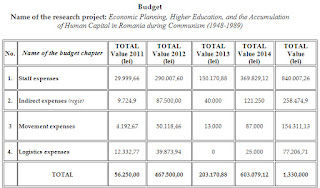Name of the research project:
Planificare economică, învăţământ superior şi acumularea capitalului uman în România în timpul regimului comunist (1948-1989).
*proiect de cercetare finanţat de Consiliul Naţional al Cercetării Ştiinţifice.
Economic
Planning, Higher Education, and the Accumulation of Human Capital in Romania during
Communism (1948-1989).
*research project financed by the National Research Council.
Code of the research project: PN-II-ID-PCE-2011-3-0476
Number of contract: 106/2011
The duration of the research project: 05.10.2011-30.09.2016.
Short description:
Code of the research project: PN-II-ID-PCE-2011-3-0476
Number of contract: 106/2011
The duration of the research project: 05.10.2011-30.09.2016.
Short description:
Human
capital is considered by a significant number of economic historians and by the
mainstream development theory as an important factor of economic growth.
The
general objective of the project is to highlight the role of higher education
as a factor of economic development in Romania during communism. In order to
achieve this goal, the project has several operational objectives, aiming to
clarify following issues:
•
The relation between the general planning of economic development and the
allocation of study places for higher education. This will include both the
total number of study places, and their distribution for different fields of
study.
•
Changes in the entry requirements and selection mechanisms for would-be
students in Romania during communism.
•
The decision-making process and mechanisms contracting Romanian higher
education during the 1980s
•
The accumulation of human capital through higher education in communist
Romania.
•
The consequences of the communist planning of higher education for the
post-communist labor-market
The
project will provide important knowledge for the economic and social history of
Romania during communism, for the planning and decision-making processes inside
the communist system. It will be relevant also for the current debates
regarding the methods to measure human capital in non-market economies.
Operational objectives and milestones :
Operational objectives and milestones :
Operational
objective 1. The relation between the general planning of economic development
and the allocation of study places for higher education
- The
general pattern of decision-making in the planning of Romanian higher education
during communism.
- The
quantitative reconstruction of the total number of study places for higher
education allocated centrally during the period 1948-1989, and their breakdown
according to study fields, forms of study and institutions of higher education.
- 2
case-studies regarding the decision-making process regarding the allocation of
study places for higher education. The cases will be selected in accordance to
the magnitude of change compared to the previous year and considering the
availability of relevant sources.
Operational
objective 2. Changes in the entry requirements and selection mechanisms for
would-be students in Romania during communism.
- Inventory
of the regulations regarding the access to institutions of higher education.
- The
quantitative reconstruction of the competition for study places for a selected
number of study fields and institutions.
- 2
case-studies regarding the concrete functioning of entry requirements to
specific institutions of higher education. The cases will be selected according
to their relevance for the whole system of higher education and considering the
availability of relevant sources.
Operational
objective 3. The decision-making process and mechanisms contracting Romanian
higher education during the 1980s.
- Identification
of the major cuts in the allocation of study places during the 1980s (based on
milestone 2 of Operational objective 1)
- Case
study on the decision-making process of the first major cut of the total number
of study places
- Case
study of the arguments and actors resisting the contraction of the Romanian
higher education
Operational
objective 4. The accumulation of human capital through higher education in
communist Romania.
- Workshop
on the current debates and controversies about the development of human capital
in communist systems
- The
quantitative reconstruction of the stock of education for selected years
(considering the available studies and data)
- The
quantitative reconstruction of the wages for graduates of higher education,
compared with those for employees without higher education
- 1
case study regarding the accumulation of human capital in a particular economic
sector. The choice of this sector will be determined according to the
availability of relevant sources.
Operational
objective 5. The consequences of the communist planning of higher education for
the post-communist labor-market.
- Quantitative
reconstruction of the stock of higher education graduates in the early 1990s
(with breakdowns according to fields of study, age and location)
- Comparison
between the demographic trends and the quantitative evolution of higher
education during communism and in the first decade of post-communism.
- Qualitative
analysis of selected cases of professional conversion in post-communist
Romania.


Institution financing the project:
Consiliul Naţional al Cercetărilor Ştiinţifice
Address: 21-25 Mendeleev Str., 010362, Bucuresti, Sector 1.
Tel: 021 302 38 50; Fax: 021 311 59 92.
Tel: 021 302 38 50; Fax: 021 311 59 92.
Web-site: http://www.cncs-uefiscdi.ro
UNITATEA EXECUTIVĂ PENTRU FINANŢAREA ÎNVĂŢĂMÂNTULUI SUPERIOR, A CERCETĂRII,
DEZVOLTĂRII ŞI INOVĂRII
Address: 21-25 Mendeleev Str., 010362, Bucuresti, Sector 1.
Web-site: www.uefiscdi.gov.ro

Contracting institution:
Universitatea din Bucureşti
Address: 36-46 M. Kogălniceanu Bd., 050107, Bucureşti, Sector 5.
Tel./Fax: +40-21-307 73 00. +40-21-313 17 60
Contact: Rector Professor Ph.D. Mircea Dumitru.
Web-site: www.unibuc.ro

Budget of the research project
(click to enlarge)
(click to enlarge)


